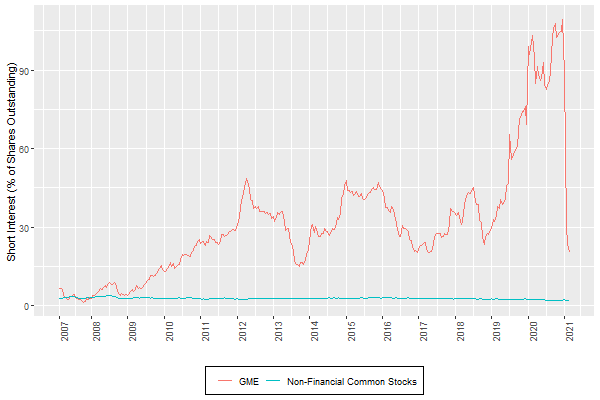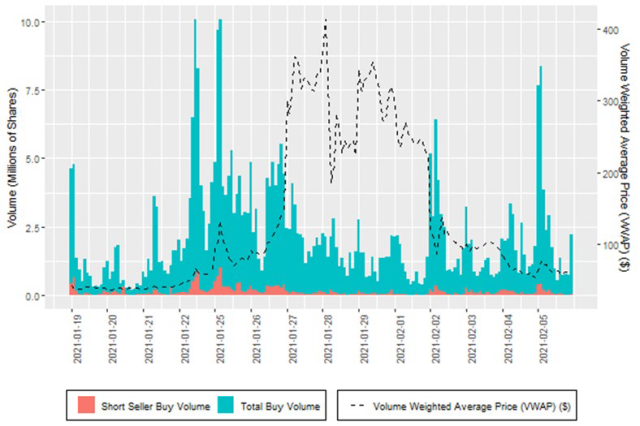
This week, a 45-page report from the Securities and Exchange Commission takes a detailed look at the situation and concludes that, while "short sellers covering their positions likely contributed to increases in GME’s price... a short squeeze did not appear to be the main driver of events."
The setup
Among the so-called "meme stocks," GameStop was particularly susceptible to a short squeeze in January. That's because the level of "short interest" in the stock—the ratio of borrowed shares to total outstanding shares—spiked to an unprecedented 122.97 percent (reborrowed shares essentially count a second time, which can drive the ratio past 100 percent).
For context, the SEC points out that "few stocks, if any, have short interest greater than 50% on a given date" and that "until recently, short interest of more than 90% was observed only a few times—in 2007 and 2008." And while other meme stocks also had high short interest in January—Dillard's came closest with a 77.3 percent ratio, followed by Bed Bath and Beyond at 66.02 percent—the SEC notes that "GME is the only stock that staff observed as having short interest of more than shares outstanding in January 2021."

That extreme level of one-sided betting against GameStop's stock price was ripe for disruption, especially once some bullish retail investors started driving the price up (partly in response to Chewy co-founder Ryan Cohen being named to the board of directors on January 11). And looking back at the individual trading data, the SEC found some evidence that short sellers covering their positions helped contribute to the initial stages of GameStop's January price spike.
The report observes that "buy volume from participants identified as having large short positions" increased heavily starting January 22 and that "during some discrete periods, GME had sharp price increases concurrently with known major short sellers covering their short positions after incurring significant losses," patterns pointing to a short squeeze. SEC staff also "observed discrete periods of sharp price increases during which accounts held by firms known to the staff to be covering short interest in GME were actively buying large volumes of GME shares, in some cases accounting for very significant portions of the net buying pressure during a period," the report says.
What else was going on?
But, while a short squeeze contributed to GameStop's initial stock price spike, the report suggests that's not the whole story. Buyers with short positions were "a small fraction of overall buy volume," the report says, even during the biggest price spikes, meaning that other buyers were driving the bulk of the demand for the stock. And demand for GameStop stock was incredibly high during that period; as the report notes, "From January 13-29, an average of approximately 100 million GME shares traded per day, an increase of over 1,400% from the 2020 average." Short sellers covering their positions were part of that, but they were far from the bulk of it.

In addition, the SEC notes that "GME share prices continued to be high after the direct effects of covering short positions would have waned." If this were nothing but a short squeeze, the price should have fallen back to earth once the short interest fell to more reasonable levels.
reader comments
178